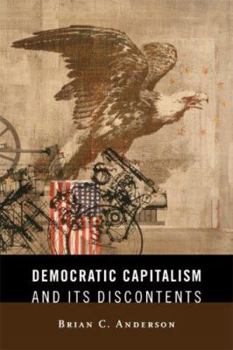Democratic Capitalism and Its Discontents
Select Format
Select Condition 
Book Overview
Despite the fall of its ideological enemies--the political messianisms of communism and national socialism--democratic capitalism faces extraordinary challenges in the new millennium, argues City Journal editor and South Park Conservatives author Brian C. Anderson in this thought-provoking new book. Not only has a fanatical form of Islam distrupted the peace and prosperity of the postcommunist era, which some had wrongly heralded as a liberal-democratic "end of history"; our free societies also remain haunted by internal demons--egalitarian fantasies, moral libertinism, an arid and unsustainable secularism, a suicide of culture. Yet nothing ordains the triumph of these demons over the democratic capitalist prospect, Anderson believes. Drawing on a rich anti-utopian tradition of political thought, he defends the real achievements of the free society against an array of critics, ranging from Jean-Paul Sartre to British anti-market conservative John Gray to the quietly authoritarian social democrat John Rawls to the postmodern Marxist and one-time terrorist Antonio Negri. Anderson pays particularly close attention to the United States, the democratic capitalist nation par excellence, showing how it differs from other liberal democracies in its robust religiosity, vigorous civil society, and constitutionalism--all under threat from the American Left. Finally, Anderson explores the thought of some of the deepest anti-utopian thinkers who are friends--albeit critical ones--of the modern regime of liberty, including the brilliant French political theorist Pierre Manent and the godfather of neoconservatism, Irving Kristol. Crisply and vividly presented, Democratic Capitalism and Its Discontents is an essential guide to the conflicts of our time.
Format:Hardcover
Language:English
ISBN:1933859245
ISBN13:9781933859248
Release Date:June 2007
Publisher:Intercollegiate Studies Institute
Length:225 Pages
Weight:0.95 lbs.
Dimensions:0.8" x 5.5" x 8.3"
Customer Reviews
3 ratings
Another Stand-out Book from Mr. Anderson
Published by Thriftbooks.com User , 17 years ago
All I could think of while reading these essays was how much Mr. Anderson reminded me of Roger Kimball--my favorite conservative writer and thinker. Anderson's South Park Republicans was an excellent book, but this one is even better. It's a serious examination of cultural trends along with the malignant beliefs of our anti-capitalist, and yes anti-democratic, intellectuals. I read a review of it in National Review which made me wary, so the book itself was a pleasant surprise. It made it sound like it was an obscure philosophical work. On the contrary, however, this short collection of essays is full of vigor and specificity. Democratic Capitalism addresses both the pathologies of the political left along with the idiosyncrasies of a gaggle of talking heads. The dissection of Hardt and Negri's Empire was a joy to digest, and far preferable to actually having to read it. I also found his examination of Jean-Paul Sarte enlightening. The man was a monster...yet so much less. When I was in college debate, the name John Rawls was on everyone's lips; although, his was a slippery and allusive form of justice; one which made no room for his ideological opponents. Mr. Anderson illuminates the non-democratic tendencies of Rawls along with those of many other figures. The essay on the rise of judicial activism was pretty horrifying but went a long way in explaining the culture in which we now find ourselves. What hope is there for conservatives given the recent victories of emotion over reason and of political correctness over freedom in our daily life? The future appears rather dim but we should be cheered by our foes rampant insecurity. This suggests that our side, just by the nature of its continued existence, may be more powerful than we suspect.
The better way is balance - not Perfection
Published by Thriftbooks.com User , 17 years ago
One central insight of this book is the notion that Mankind cannot create a perfect political order for itself- and that efforts to bring about a Utopian order for Mankind have been and will always be- disastrous. Pointing to the secular Utopias that failed in this century and took over one- hundred million lives, the champion of democratic capitalism Anderson refuses to gloat. The victory of democratic capitalism and the increasing effort of Mankind to move in the direction of the relatively successful American model have not brought paradise either. Anderson relying on the analysis of the French Historian Francois Furet points to two flaws in free- market societies. The first is that preaching an equality of opportunity they lead to unrealistic egalitarian expectations. Secondly , the societies suffer from moral uncertainties. Their giving so much weight to individual judgment and decision mean that they bear within them a tendency to moral anarchy. And it is possible to argue that many of the social ills which have come to plague America in the last half- century especially have come out of an excessive retreat of public communal ethic before individual wish and whim. Anderson in his defense of democratic capitalism urges a modification towards greater balance between communal obligation and individual judgment. He provides readings of key thinkers such as the radical egalitarian John Rawls, Bernard de Jouvenal. His work is in the tradition of the sensible defenders of liberty and democracy perhaps most notably Isaiah Berlin. An instructive , timely and important work.
An important new work on globalization.
Published by Thriftbooks.com User , 17 years ago
Anderson's fast-paced book is a perfect guide to some of the big questions of our time: Is globalization good or bad? How does the American model of democratic capitalism compare with Europe's social democracies? Why do so many intellectuals despise the free society? Anderson's central argument--to adapt Churchill, democratic capitalism is the worst form of society except for all the others that have been tried--is reasonable and elegantly expressed. Required reading for anyone interested in politics...five stars!





